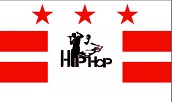
In a June 2016 interview with the Breakfast Club DJ Drama said, “One thing about Atlanta is every 3, 6, 9 months there’s always somebody hot, somebody new.”
Start with that, and as Nicki Minaj says, “Let it soak in like seasoning…” and then weigh it against your own observations about the state of Hip Hop in DC. What did you come up with? That the music industry infrastructures in Atlanta and DC are so wildly different that a fair comparison is impossible to draw? True. But if you conclude that, then it begs the question, “What’s up with that?”
In the past we’ve put a variation of this question to three highly regarded people with insights into the DC music scene; Cathy Hughes, Marcus J. Moore, and DJ Boom. Then we read a recent review by the esteemed music writer Marcus K. Dowling about the “Glowed Up” showcase in which he postulated that we are witnessing a transition in DC Hip Hop that will (maybe) put us on par with major markets. Then we listened to an Tabi Bonney on WLVS Radio where homeboy couldn’t even compile a list of up and coming DC artists, which to be fair is not his job.
In a Sophisticated Sunday interview with us Radio One founder Cathy Hughes said, “This city has produced some of the greatest names in music; Marvin Gaye, Duke Ellington, Roberta Flack, Herb Fame, Billy Stewart; I mean the list is endless. Chuck Brown. Chuck Brown created an entire music genre. He created go-go. But I think it’s always going to be hard for the entertainment industry to get a foothold in DC…”
Nationally known music writer Marcus J. Moore, who is now a senior editor at Bandcamp basically did a must-read primer for any DC artist who seriously wants to get to the next level in his “10 Questions 4” interview with OnStage. Importantly he said, “Too many young rappers want to emulate the people who’ve already got on; they dress and rap like Wale, and wonder why no one takes them seriously. We need more young rappers to provide the alternative, to create art that’s dynamic and different, not just the same cookie-cutter nonsense that’s so popular now. The rap game is a rat race, so when they see someone earning money rhyming a certain way, they feel the need to reinvent the wheel instead of making music with staying power. We need artists to provide the alternative, and stop trying to fit in with the crowd. If everyone else is creating what you’re creating, why should anyone pay attention to you? What makes you stand out? Now that Fat Trel is beginning to make national strides, the field is wide open for someone to take the crown. I just hope the next rapper does something unique. They can’t always pop bottles and sell drugs.”
And Listen Vision Studio founder and owner Jeremy Beaver aka DJ Boom in a December 2012 “10 Questions 4” interview pointed out something that 4 years later still provides the best answer to the Atlanta/ DC comparison; “…what the area seems to be missing is industry, i.e., record labels, management companies, booking agencies, and major corporations willing to work with or utilize the wealth of talent in this area. We have BET, Discovery, XM/Sirius, National Geographic, RIAA, Radio One and others; but their local community integration is limited.”
Put those three observations together you come up with; DC has always been a storehouse of talent but where Hip Hop is concerned even our most talented artists can’t find traction because too much of what they’re doing is emulative as opposed to being groundbreaking, and what’s missing is the same music industry infrastructure in place and available in Atlanta, i.e.., record labels and management companies, marketing professionals and access to distribution networks.
Marcus K. Dowling’s always astute observations are backed by a foundational knowledge you don’t find in everyone whose job it is to write about music. The Glowed Up review, though it seemed a bit deadline rushed and didn’t flesh out all the thoughts he probably wanted to share is a good jump off point for a discussion of the state of Hip Hop in DC and its surrounding area. Respectfully, we’d disagree that DC has a “now nationally relevant rap scene.” That aside, what is most prescient is his point about transitions and that he believes the artists he was reviewing represent the revitalization of DC area Hip Hop. Awthentik and Cane and Brain Rapp and Nature Boi bring stylistic flourish and craftsmanship to the table. They make the kind of music Marcus J. Moore is calling for DC artists to make. As far as local artists go they are among the most competent, with Awthentik and Brain Rapp definitely deserving of national attention.
But the music business doesn’t reward artistic competence alone. It takes that, and luck, and timeliness, and who you know, and how you are marketed and a bunch of other stuff. And location does play its part. The “business” part of the music business isn’t looking for artistry. It’s looking for sales. That’s the catch for DC. Artists who can’t sell in their hometown don’t breed any confidence that they can do so nationally and globally. It has to start at home with clubs playing your music, and radio playing it, and sold-out local appearances and folks paying to download the music of their favorite local artist. So we are back to infrastructure of which the most relevant aspect is a fully fleshed out ability to market your brand and product.
In Part 2 we’ll talk about infrastructure and market development and name 10 local artists who should be the tip of the spear in leading DC to the next level in the music industry.

